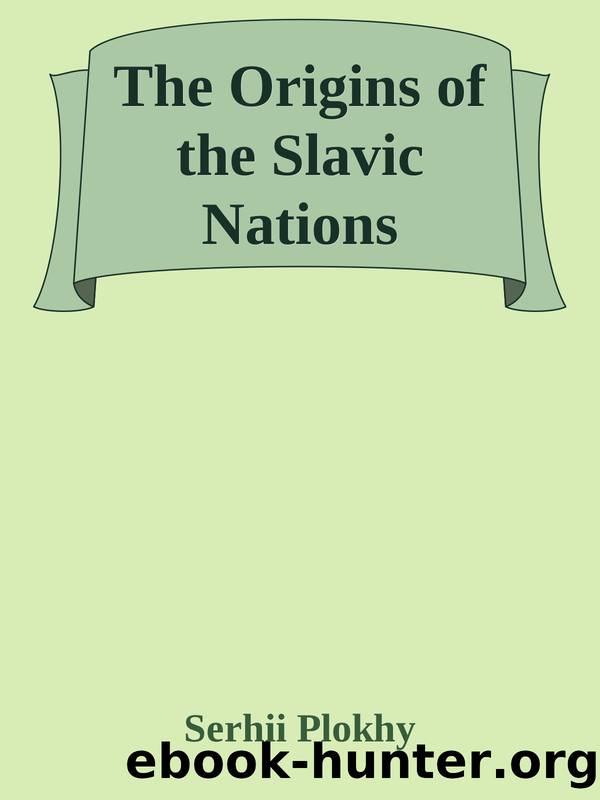The Origins of the Slavic Nations by Serhii Plokhy

Author:Serhii Plokhy [Plokhy, Serhii]
Language: eng
Format: epub
Publisher: Cambridge University Press
Published: 2006-09-07T00:00:00+00:00
[49] See my Cossacks and Religion, pp. 149â52.
[50] See Petro Kraliuk, Osoblyvosti vyiavu natsionalâ²noï svidomosti v ukraïnsâ²kii suspilâ²nii dumtsi 16 â pershoï polovyny 17 st. (Lutsk, 1996), pp. 71â73.
[51] On Uniate arguments to that effect, see Ihar I. Marzaliuk, Liudzi daÅniai Belarusiâ: Ätnakanfesiinyia i satsyia-kulâ²turnyia stereotypy (XâXVII st.) (MahilioÅ, 2003), pp. 84â85.
[52] On Smotrytsky, see Frick, Meletij Smotrycâ²kyj.
[53] Smotrytsky, Verificatia niewinnoÅci (Vilnius, 1621), p. 60 (quoted in Frick, Meletij Smotrycâ²kyj, p. 235). For a discussion of Smotrytskyâs views on the âRuthenian nation,â see ibid., pp. 229â38.
[54] Among the princes, the percentage of marriages outside their confession appears to have diminished from approximately 50 percent in the period 1540â1615 to 29 percent in the years 1616â50. By 1616 most princely families had already abandoned Orthodoxy and married within their new confession (predominantly Roman Catholicism). By that time the confessionalization of religious life in the Commonwealth was well advanced, making interconfessional marriages and families an exception to the general rule. These developments reduced the number of interconfessional marriages not only among the princes but also among the Ruthenian nobility in general. According to Yakovenkoâs calculations, they declined from 16 percent (1581â1615) to 12 percent (1616â50) (Iakovenko, âRelihiini konversiï,â p. 36).
[55] See Natalia Iakovenko, âLatyna na sluzhbi kyievo-rusâ²koï istoriï (Camoenae Borysthenides, 1620 rik),â in eadem, Paralelâ²nyi svit, pp. 270â95, here 292.
[56] For an often erroneous Ukrainian translation of this Latin poem, see Ukraïnsâ²ka poeziia â ©â ¦ stolittia (persha polovyna). Antolohiia, comp. V. V. Iaremenko, ed. O. V. Lupii (Kyiv, 1988), pp. 93â119. For an analysis of the poem, see Ihor Å evÄenko, âPoland in Ukrainian History,â in idem, Ukraine between East and West, pp. 112â30, here 124â26â; Iakovenko, âLatyna na sluzhbi kyievo-rusâ²koï istoriï.â
[57] On the treatment of Janusz Ostrogski (Ostrozky) and the Zaslavsky princes â heirs of the Ostrozkys and protectors of the Uniate Church â in panegyrical literature, see Iakovenko, âTopos âzâ²iednanykh narodiv,ââ pp. 248â54.
[58] Members of a nobiliary dietine convoked at Berestechko in March 1573 described themselves as followsâ: âWe the councillors, dignitaries, land and castle officials and the whole knighthood of the noble nation [descent], citizens of the Volhynian land.â See Petro Sas, Politychna kulâ²tura ukraïnsâ²koho suspilâ²stva (kinetsâ² â ©â ¥ â persha polovyna â ©â ¦ st.) (Kyiv, 1998), pp. 44â45.
[59] See extensive quotations from both documents and a discussion of their contents in Mykhailo Hrushevsâ²kyi, Istoriia ukraïnsâ²koï literatury, vol. VI (Kyiv, 1995), pp. 201â7, 272â91.
[60] For a discussion of Smotrytskyâs use of the term âRuthenian nationâ and the multiple meanings that he attributed to it, see Frick, Meletij Smotrycâ²kyj, pp. 232â34. Cf. Kraliuk, Osoblyvosti vyiavu, pp. 76â80.
[61] Quoted in Hrushevsâ²kyi, Istoriia ukraïnsâ²koï literatury, VIâ: 295. For an English translation of part of this statement, see Frick, Meletij Smotrycâ²kyj, p. 233. Cf. the reprint of Smotrytskyâs Justification in Collected Works of Meletij Smotrycâ²kyj, vol. I (Cambridge, Mass., 1986), p. 513.
[62] Quoted in Hrushevsâ²kyi, Istoriia ukraïnsâ²koï literatury, VIâ: 254. Cf. Plokhy, The Cossacks and Religion, pp. 160â61. On the spread of the Union among the Volhynian nobility, many of whose representatives supported Orthodoxy or the Union
Download
This site does not store any files on its server. We only index and link to content provided by other sites. Please contact the content providers to delete copyright contents if any and email us, we'll remove relevant links or contents immediately.
The European Opportunity by Felipe Fernández-Armesto(569)
The European History Highway: A Guide to Internet Resources by Dennis A. Trinkle Scott A. Merriman(535)
Morgan Kaufmann Digital Watermarking and Steganography by Ingemar Cox Matthew Miller Jeffrey Bloom Jessica Fridrich Ton(528)
The Seven Wonders of the Ancient World by Michael Denis Higgins(518)
Hyperculture by Byung-Chul Han(506)
European Security in a Global Context by Thierry Tardy(504)
European Security without the Soviet Union by Stuart Croft Phil Williams(502)
The Routledge companion to Christian ethics by D. Stephen Long Rebekah L. Miles(497)
Get Real with Storytime by Julie Dietzel-Glair & Marianne Crandall Follis(443)
Hudud Al-'Alam 'The Regions of the World' - a Persian Geography 372 A.H. (982 AD) by V. V. Minorsky & C. E. Bosworth(436)
Gorbachev And His Generals by William C. Green(428)
Tibetan Studies in Comparative Perspective by Chih-yu Shih Yu-Wen Chen(427)
Governance, Growth and Global Leadership by Espen Moe(417)
How Languages Are Learned 5th Edition by Patsy M Lightbown;Nina Spada; & Nina Spada(406)
CliffsNotes on Fitzgerald's The Great Gatsby by Kate Maurer(398)
The Oxford History of the World by Fernández-Armesto Felipe;(388)
The Egyptian Economy, 1952-2000 by Khalid Ikram(377)
Oral Poetry and Narratives from Central Arabia: The Poetry of Ad-Dindan : A Bedouin Bard in Southern Najd (Studies in Arabic Literature, Vol 17) (English and Arabic Edition) by P. M. Kupershoek P. Marcel Kurpershoek(365)
The Oxford Handbook of the Incas by Sonia Alconini(364)
